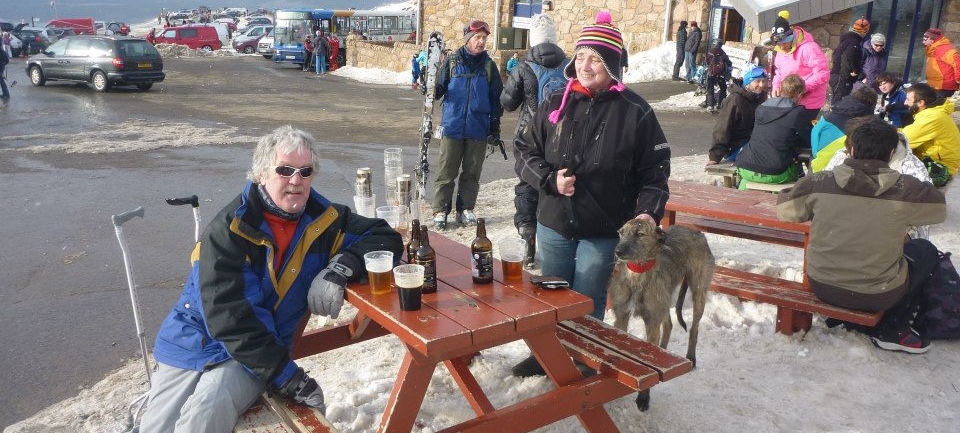What is MND
Find support
I have MND
I am supporting someone
Get involved
Research
About MND Scotland

Jim, who was brought up in Morayshire, is married to Alison and together have three children; Julie, Amber and Rohan; and three grandchildren; Imogen (5), Kyle (5) and Orla (3).
A lover sports and gardening, the super active Physics teacher first noticed something was wrong in 2008.
He said “I had poor control of my left foot, for example when changing gear on my motor bike or I felt it was getting harder to control my skiing. I also found that I could not keep time tapping my left foot to music. I had had what I think is ‘restless legs’ for about a year before. It felt like I had itching powder in my blood. Then I noticed I had a drop foot and it was getting hard to balance on my left leg – that was when I went to the doctor, in July 2008.”
Exactly a year later Jim received the devastating diagnosis of MND in July 2009. MND is a rapidly progressing terminal illness, which stops signals from the brain reaching the muscles. This may cause someone to lose the ability to walk, talk, eat, drink or breathe unaided.
He continued, “My immediate feeling was that my future had been replaced by a black hole. I had plans for what we were going to do after I retired, like continuing my hobbies and traveling more, and these evaporated and were replaced by frightening uncertainty. I obviously have a slow developing form of MND so I have been able to make plans for the short term, but I still feel I have been stripped of my future.
“I have always been very physically active. I started skiing when I was 14 and had to stop when I was 57 because the disease was progressing. I loved to play golf in summer and as a teacher I played plenty of badminton and took part in training with senior pupils every week. I took part in most teacher vs. pupils sports, like five-a-side football. At home I had a large garden which kept me busy too. Giving up these activities has been a bitter blow and of course I am constantly reminded of this when I see sports on TV or hear others talking about them.
“People tell me I am coping well, and similarly I think my family has shown great resilience and have focussed on the practical ways to help me. I still find I am thinking about the restrictions caused by my MND most of my waking hours.
“I can still walk short distances, for example, across a room, using a frame and I can transfer from a chair to my wheelchair which I use most of the time. My muscles are very weak and my voice is almost gone. Apart from the obvious restrictions caused by my physical deterioration, the hardest thing is managing my expectations. I start to do things and then find I am not physically able to do them. I also find I am planning to do things like go to visit places or go on holidays, then realise there is no way I can actually make it happen. It is also hard knowing that I won’t be part of my grandchildren’s life beyond the first few years.”
With only two more years to go before retirement Jim stopped working when he was diagnosed.
He said “As a science teacher you are responsible for the safety of the pupils. With the physical effects of MND I couldn’t ensure the safe environment in the lab. Also, at the initial diagnosis no time scale for the progression can be given so I felt that time was precious and I didn’t want to spend it working.”
Jim and his family have been supported by the charity MND Scotland, “We have had lots of support from MND Scotland; from providing information which has made it easier to plan the future; to financial help in getting equipment and adaptions; and dealing with form filling and applications for benefits and local council support.”
For MND Awareness Week 2018, we launched a new campaign to raise awareness of the stigmas and misconceptions faced by people with MND.
Jim shared his thoughts on the issue, “The most common one is when people hear that my speech is slow and indistinct; they assume my thought processes are also deficient and they talk slowly using simplified language as if I have difficulty understanding normal speech. I wish more people realised that it is only a physical illness and my mental capacity and thinking are not diminished. Often people think I am also deaf.
“The main misconceptions about the illness are that my condition can improve (good days and bad days is often a phrase used), and that MND is just a severe form of MS. My family and close friends have investigated the illness so have a good understanding of the condition, but outside of people who have first-hand knowledge of a person who has MND there is an understandable lack of knowledge of the fine detail of how the illness starts and progresses. In the nine years I have been living with it I have seen an improvement in this but the more awareness we can raise the better, and that’s why I am sharing my story.”
Click here to find out more about our Myth-Busting MND campaign.
Sign up
for newsletter
Get the latest news and events straight to your inbox.
You can help create a world without MND